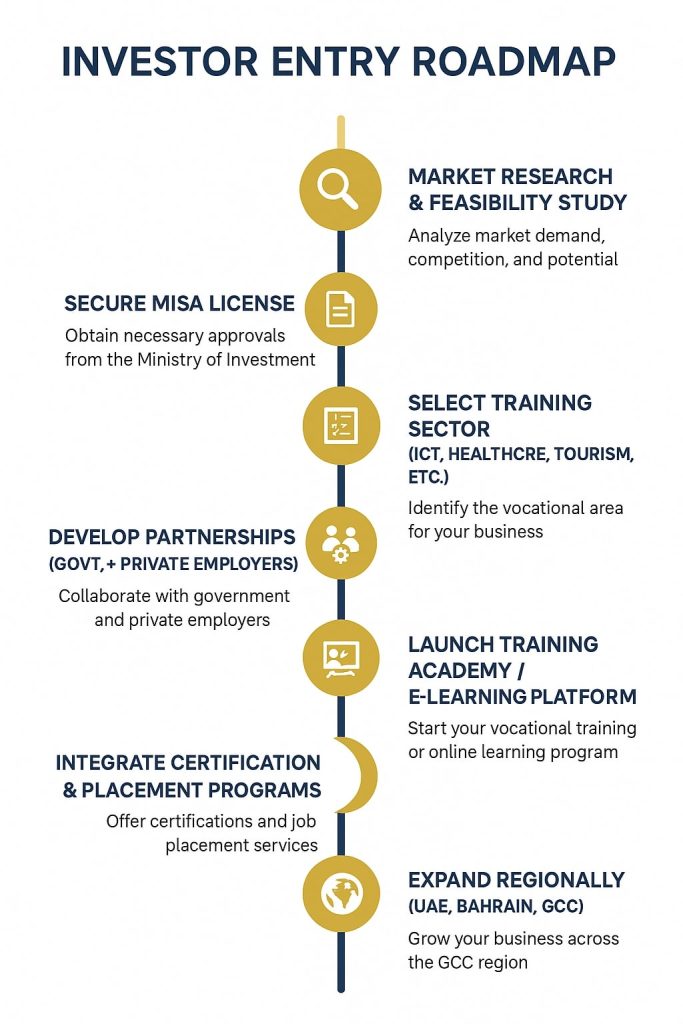+973 3373 3381
Phone Number
setupinsaudiarabia@gmail.com
Email Address
Mon - Thu: 8:00 - 5:00
Working Hours
Phone Number
Email Address
Working Hours
August 26, 2025

Introduction: Why Vocational Training is Critical for Saudi’s Workforce
Vision 2030 and Human Capital Development
Key Sectors Driving Vocational Training Demand
Business Opportunities in Workforce Development
Public-Private Partnerships in Training & Development
Case Studies: Success Stories from KSA and Beyond
The Role of Technology in Vocational Training
Challenges in Workforce Development & Solutions
How Investors Can Enter the Vocational Training Sector
Future Outlook: Workforce Transformation by 2030
Investment Checklist for Entrepreneurs
Comparative Table: Vocational Training vs. University Education ROI
FAQ Section (25 Questions & Answers)
Final Thoughts + CTA
Saudi Arabia’s labor market is undergoing a radical transformation. With Vision 2030 aiming to diversify the economy beyond oil, the demand for skilled labor in healthcare, hospitality, logistics, renewable energy, and ICT is skyrocketing.
Unlike traditional higher education, vocational training provides practical, hands-on skills tailored for the job market. This makes it a high-growth sector for businesses and investors looking to fill talent gaps while driving sustainable employment.
Vocational training is at the core of Vision 2030’s Human Capability Development Program. Saudi Arabia plans to:
Equip youth with future-ready skills.
Reduce dependence on expat labor.
Attract foreign investment in training institutes and workforce solutions.
Strengthen alignment between education and labor market demand.
📌 Opportunity: Investors can tap into government-backed projects to build training academies, e-learning platforms, and skill development centers.
Saudi Arabia’s transformation has created urgent demand for skilled workers in these industries:
Tourism & Hospitality – hotels, restaurants, cultural heritage sites.
Healthcare – nursing, clinical assistants, medical technicians.
Construction & Infrastructure – smart city projects (NEOM, Qiddiya).
Renewable Energy – solar, wind, and hydrogen plant technicians.
ICT & Digital Economy – coding, AI, cybersecurity, cloud computing.
Logistics & Supply Chain – warehousing, last-mile delivery, e-commerce.
✅ Each of these sectors represents business opportunities for training providers, staffing agencies, and investors.
Entrepreneurs can capitalize on:
Vocational Institutes – Build accredited training centers.
Corporate Training Solutions – Partner with businesses for upskilling programs.
E-Learning Platforms – Deliver skills training through digital platforms.
Staffing & Placement Services – Connect trained graduates to employers.
Certification & Licensing Services – Offer internationally recognized certifications.
💡 Pro Tip: Businesses that combine training + recruitment services will dominate this sector.
Saudi Arabia’s government is actively encouraging PPP models. Examples include:
Partnerships with international universities for technical training.
Joint ventures with private firms to establish training academies.
Industry-led vocational programs aligned with giga projects like NEOM and The Red Sea Project.
| PPP Feature | Benefit |
|---|---|
| Shared Funding | Reduces cost for investors |
| Government Support | Easier licensing & subsidies |
| Industry Alignment | Guarantees employability |
| Scalability | Rapid expansion across KSA |
Saudi Technical & Vocational Training Corporation (TVTC): Over 300,000+ students trained annually.
NEOM Skills Academy: Prepares talent for mega-project construction and innovation roles.
German Dual Training Model: Adapted in Saudi Arabia for manufacturing and engineering training.
Digital transformation is shaping workforce development through:
AI-driven e-learning platforms.
Virtual Reality (VR) for simulation-based training.
Blockchain-based certifications for global recognition.
Data analytics to match skills with labor demand.
Challenges:
Skill mismatch between graduates and jobs.
Limited awareness about vocational career paths.
Cultural preference for university degrees.
Solutions:
Industry-driven curriculum updates.
Awareness campaigns showcasing career success stories.
Collaboration with global skill councils.


Steps:
Secure an investment license via Saudi Ministry of Investment.
Choose a niche sector (healthcare, tourism, ICT).
Build partnerships with local employers for guaranteed placement.
Launch training centers or e-learning platforms.
Leverage SetupinSA for licensing, market entry, and partnerships.
📞 Contact SetupinSA via WhatsApp to get started: http://wa.link/setupinbahrain
By 2030, Saudi Arabia aims to:
Train 1+ million citizens in vocational skills.
Increase women’s participation in the workforce to 30%+.
Localize jobs across healthcare, tourism, and ICT.
Position itself as a GCC hub for workforce training.
✅ Identify demand-driven sectors
✅ Secure licensing with MISA
✅ Partner with employers for placement programs
✅ Integrate digital training tools
✅ Ensure compliance with Saudi labor laws
✅ Scale regionally (UAE, Bahrain, Oman)
| Factor | Vocational Training | University Education |
|---|---|---|
| Duration | 6–24 months | 4–6 years |
| Cost | Low–Medium | High |
| ROI | Faster (job-ready) | Slower |
| Employment | High demand in practical jobs | Saturated in some fields |
| Flexibility | Industry-specific | Generalized knowledge |
It addresses the skills gap, ensuring industries get job-ready employees faster than traditional academic programs.
Healthcare, ICT, construction, hospitality, and renewable energy.
Yes, under MISA regulations with 100% foreign ownership possible.
Yes – tax exemptions, subsidies, and land grants.
By building a skilled Saudi workforce aligned with economic diversification.
Saudi women are increasingly enrolling in healthcare, ICT, and hospitality training programs.
It reduces unemployment by creating direct job placement pathways.
Vocational = practical, job-focused skills.
Technical = specialized industry knowledge (engineering, IT).
Yes, especially when partnered with global accreditation bodies.
Yes – SMEs can access skilled labor at lower recruitment costs.
AI, VR, blockchain certification, mobile learning.
Yes – Saudi Industrial Development Fund (SIDF) and PPP models.
It equips Saudis with skills previously reliant on expat workers.
No – it also targets mid-career professionals for reskilling.
Depending on the model, from SAR 500,000 to multi-million riyal projects.
Through MOUs with large companies and government programs.
Yes – NEOM, Qiddiya, and The Red Sea Project need customized training academies.
Yes – internet penetration is over 98%, making e-learning highly scalable.
Globally 70–90%, and even higher in Saudi’s demand-driven sectors.
Course fees, corporate training contracts, government funding.
They enhance credibility and provide globally recognized certifications.
Both Arabic and English programs are offered, depending on sector.
AI will help match skills to jobs, reducing mismatch in the labor market.
By handling licensing, market entry, compliance, and partnerships.
Explosive growth, especially as Saudi becomes a regional hub for workforce solutions.

Do not hesitate to contact us. We’re a team of experts ready to talk to you.
From securing an audited company profile, handling all document attestations, and obtaining approvals from MISAto issuing your Commercial Registration, we handle the entire business setup — quickly, efficiently, and without hassle.
Hassle-free company setup in Saudi Arabia—legal structure, registration, and approvals, all handled for you.
Fast corporate and personal bank account opening with trusted local and international banks.
Stay compliant with VAT, Zakat, and tax filings—we handle it all accurately and on time.
Quick and seamless MISA license approvals for foreign investors to start operations in Saudi Arabia.
Visa processing, renewals, and government approvals—so you can focus on your business, stress-free.
Our expert pro services include visa processing, government relations, & renewals etc.
1. We Understand the Process, So You Don’t Have To
Navigating the regulations in Saudi Arabia can be complex. That’s why our experts handle all the paperwork, approvals, and formalities on your behalf.
2. Tailored Solutions for Every Business
Whether you’re a startup or an international corporation, our services are customized to fit your unique needs.
3. Your Success Is Our Priority
From the moment you contact us, your goals become our mission. We pride ourselves on fast results and exceptional service.